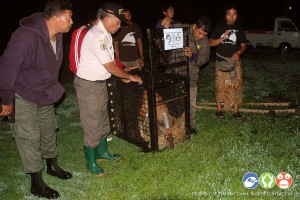It’s a tough gig working to protect nature – but then come the days that make it all worthwhile.
Amigos de la Fundación de Parques Nacionales (FNPF) staff had one of those great days recently – when we got to release two Barking deer back into the forest in the West Bali National Park.
The Barking deer, a protected species in Indonesia because of their diminishing numbers, had been living at our wildlife rescue center in Tabanan for the last 18 mes. They had earlier been rescued from illegal captivity, and arrived skinny, full of parasites and in need of care and attention.
“Being able to return animals to their natural habitat is the best part of our work, it’s what it’s all about,” said FNPF’s Founder and CEO Dr Bayu Wirayudha.
FNPF staff and volunteers are making regular visits to the park to check up on the pair – within five days one had joined the local wild population. “These deer have an important role to play in the local ecosystem – they help distribute seeds, and that in turn helps with natural forest regeneration.”
Ida Bagus Arnaya, head section of West Bali National Park management area I Jembrana , said the park rangers had often seen the pair since their release on 26 Febrero, and they seemed to be adapting well in their new home.
Our Bali Wildlife Rescue Centre is one of only seven such centers in Indonesia – and a vital link in the process of returning animals to the wild. At the center we care for and rehabilitate native endangered wildlife, mayoría de los cuales son víctimas de tráfico ilegal y la caza furtiva. The center is currently home to about 50 primates en peligro de extinción y aves, including gibbons, macaques and eagles.
Barking deer, also known as Muntjacs, are the oldest known deer species in the world. Today they are found in Indonesia, Sri Lanka, Southern China, Taiwan, Japan and India.
FNPF agradece a la Humane Society International (Australia) for funding the wildlife rescue center’s operation costs. Please support our work too, by making a donation (https://www.fnpf.org/donate-to-fnpf ) through our website – no donation is too small.
Para obtener más información o para concertar una entrevista, pónganse en contacto con Communication Manager Kirana Agustina de FNPF en (+62361) 977978 o por lo : info@fnpf.org.







